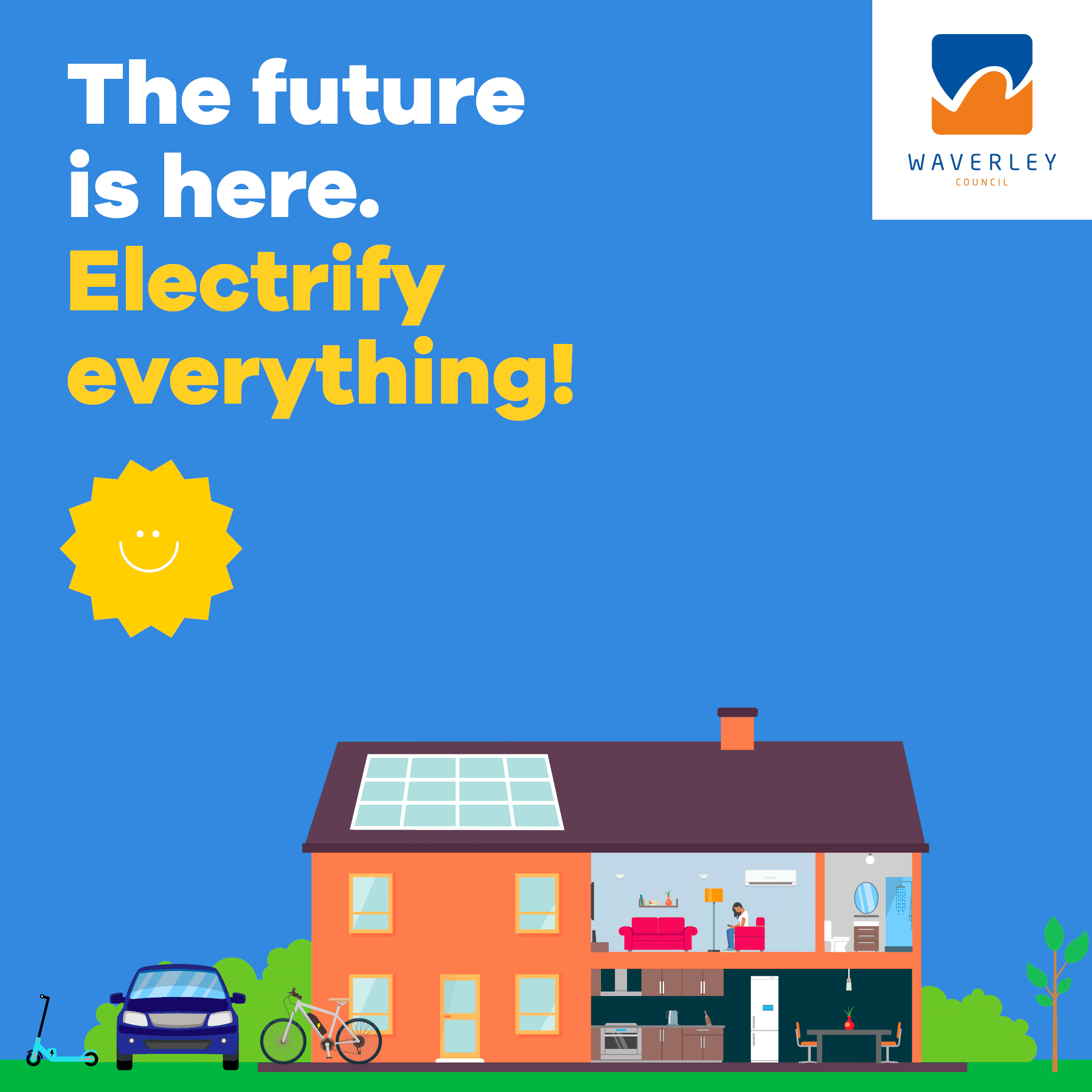- Home Home
-
Residents
Residents
- Waste & recycling Bins, clean-ups and disposing of tricky household items
- Parking Permits, car parks, maps and safety
- Your trees, plants & garden Tree pruning, native gardens and Living Connections
- Neighbourhood issues Report and resolve common issues
- Pets Dog and cat ownership, lost animals and off-leash parks
- Precinct committees Your local connection to Council
- Waverley LGA Maps Maps of the environment, planning zones and more
- Payments Pay for rates, certificates, permits and licences
-
Community
Community
- Children, youth & family services Early education, day care, support & resources
- Awards & grants Local Hero Awards, Garden Awards, Small Grants
- Get involved in your community Volunteering, creating connections, gardening
- Over 60s Services, activities, Mill Hill 60+ program
- Housing & homelessness Affordable housing, programs & support services
- Cultural diversity & inclusion Multiculturalism, language help, citizenship
- Aboriginal & Torres Strait Islander people Commitment to Reconciliation, plans & policies
- Disability inclusion Support services, access & inclusion projects
-
Business
Business
- Resources for Business Events, grants and support
- Innovation Roadmap 2025 to support business
- Tourism Home to Australia's most famous beach.
- Sponsorship Support local events
- Procurement Submitting tenders & expressions of interest to Council
- Commercial waste & recycling services Tailored waste services for business
- Mobile vending Waverley has limited mobile vending licenses
- Hello Bondi Council’s website to help visitors enjoy their stay
-
Recreation
Recreation
- Events Browse performances, exhibits and experiences
- Places of interest Historic buildings, markets, dining and Bondi Pavilion
- School Holiday Programs Fun-filled activities, workshops and events.
- Beaches & coast Beach information, safety, pool cleaning schedules
- Parks & reserves Location, public facilities and accessibility
- Arts & culture Artistic vision, creative programs, spaces and awards
- Venue & sport facilities hire Book indoor venues and sport facilities in Waverley
- Use of public spaces Events, commercial activations, filming etc
-
Environment
Environment
- Council leadership on environmental action Research, strategies and Council programs
- Climate resilience and reducing emissions Switch to electric, go solar and grants for apartments
- Water and the coast Keep beaches clean, save water and enjoy the sea
- Towards zero waste Reduce waste at home and at work
- Public tree management & urban greening Street Tree Masterplan and planting zones
- Native vegetation and animal habitat Join Bushcare and enjoy Waverley’s natural spaces
- Transport Council policy, bike and car share, electric vehicles
- Second Nature Council’s environmental news and events hub
-
Planning & Development
Planning & Development
- Development Applications The DA process, key documents & community consultation
- DA Tracking Tool Search a Development Application by number or date
- Application forms & certificates incl Planning, Rating, Construction and Occupation
- Waverley Local Planning Panel (WLPP) DA determination panel
- Compliance and regulations incl fire safety, food, pools and pollution
- Heritage incl Heritage Conservation Areas and fact sheets
- Urban planning and design Making Waverley a great place to live and work
- Major projects Council-delivered buildings, streets and parks
-
Council
Council
- Organisation structure Four directorates serve the community
- Mayor & councillors Your Mayor, Councillors, wards and contact details
- Council & committee meetings Dates, agendas and minutes of meetings of Council
- Advisory committees Advisory Committees of Council
- Policies, plans, strategies and reports Council's vision and delivery
- Jobs Current vacancies and working at Waverley
- Access to information Gaining access to publicly available information
- Payments Pay for rates, certificates, permits and licences
- Home
- >
- Environment
- >
- Climate resilience and reducing emissions
- >
- Go electric
- Council leadership on environmental action
- Climate resilience and reducing emissions
- Water and the coast
- Towards zero waste
- Public tree management & urban greening
- Native vegetation and animal habitat
- Transport
- Second Nature
Go electric
Waverley Council is supporting homes and businesses to transition away from natural gas appliances and petrol vehicles to all-electric appliances and vehicles, which can be powered by renewable energy.

To get started, download Council's cheat-sheet Make a Plan to Go Electric or browse the resources below.
Switch to electric cooking, heating and hot water
The Waverley Development Control Plan 2022 prohibits the installation of gas cooking and heating in new homes, primarily due to health concerns including a link to childhood asthma, but also due to the environmental impact of gas.
Switching away from gas can also save residents money. A 2022 Climate Council study found it would be cheaper for households in all Australian capital cities analysed to be fully electric, with Sydney residents expected to save up to $924 on yearly bills.
Home master chefs also need not be concerned about saying goodbye to their gas cooktop, with Neil Perry leading the way.
- To switch from gas cooking to electric, look for an induction cooktop and an electric oven. If you want to trial an induction cooktop, Waverley Library has portable induction stoves for loan.
- To switch from gas heating to electric, look for high efficiency reverse cycle air conditioning or heat pump hydronic heating. The NSW Government Energy Saving Scheme may be able to assist with the cost of air conditioning, including upgrading existing air conditioning.
- To switch from gas hot water to electric, consider a heat pump system or a solar water heater. If those options are not possible, go for a standard electric hot water heater, checking the energy rating. The NSW Government Energy Saving Scheme may be able to assist with the upgrade cost, as can the Federal Government Small-scale Renewable Energy Scheme.
- To switch from gas hot water heating for a pool to electric, consider solar heating, or if that’s not possible, heat pump heating. The NSW Government Energy Saving Scheme may be able to assist with the upgrade cost.
- If you’re considering installing solar power to generate your own energy, read more.
Are you a business? The NSW Government have programs, grants and schemes to assist upgrading inefficient equipment, including furnaces, heating/cooling and hot water. Read more. |
Switch to an electric vehicle
As of April 2024, there were 3,606 EVs across Waverley, Woollahra, and Randwick. By 2025, it is projected that this number will increase to 10,000 EVs in the Eastern Suburbs, with more than 35,000 EVs local by 2030 (this excludes EV drivers visiting from other areas).
The electrification of transport, powered by renewable energy is a key to achieving Council’s net zero target by 2035.
Waverley Council, along with Woollahra and Randwick are facilitating more public charging stations near shopping and residential areas as part of the Eastern Suburbs Electric Vehicle Infrastructure Strategy 2023. Residents can locate their nearest EV charger using the Plugshare app.
See the Electric Vehicle page for more information.
There are incentives to switch to an electric vehicle:
- The Federal Government’s Electric Car Discount exempts the purchase of EV from Fringe Benefit Tax in certain circumstances, such as when salary sacrificed.
- Waverley Council discounts parking permits for low emissions vehicles.
- The NSW Government Electric Vehicle Rebate ended in December 2023, however individuals and businesses that purchased or placed a deposit on an eligible EV prior to 1 January 2024 are still eligible to receive the rebate, regardless of when the vehicle was delivered. The NSW Government is now concentrating funding on charging infrastructure.
Electric vehicle charging for apartments
The NSW Government is assisting eligible NSW apartments by co-funding the assessment and installation of EV infrastructure upgrades, through the EV Ready Building Grants.
The first grant round is closed, but a follow up round is expected to be announced in 2024/25.
Council is currently offering a rebate for apartments who wish to undertake an EV feasibility study for their apartment block. To find a local consultant who conducts the EV feasibility study visit the Strata Energy Consultants List.
For more information on how to install EV chargers in apartments, see the Electric Vehicle Charging in Apartments Webinar (2022).


